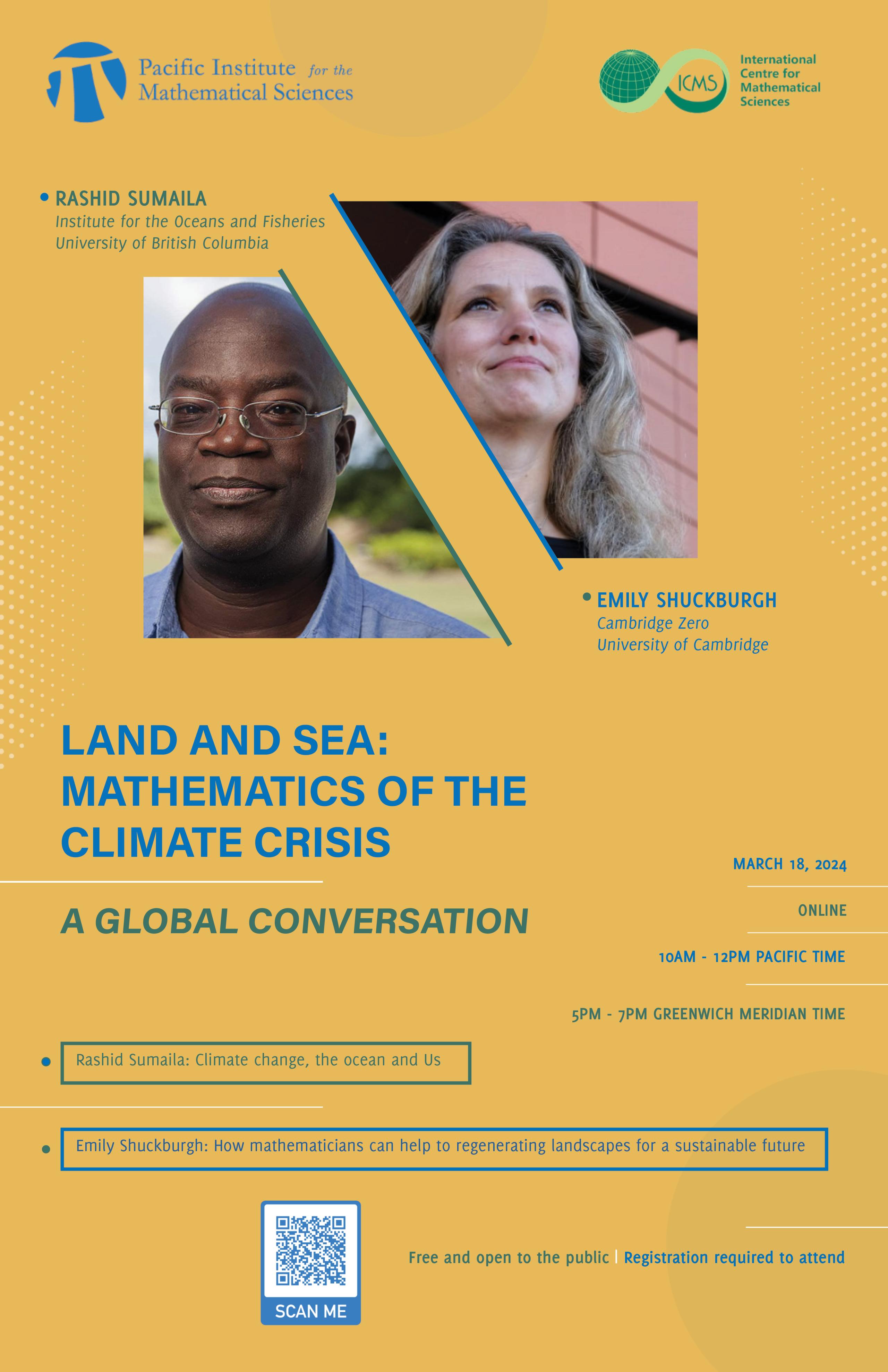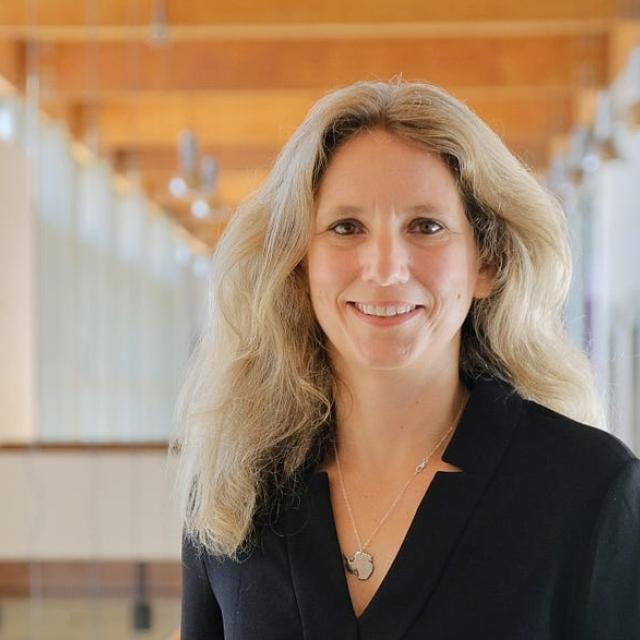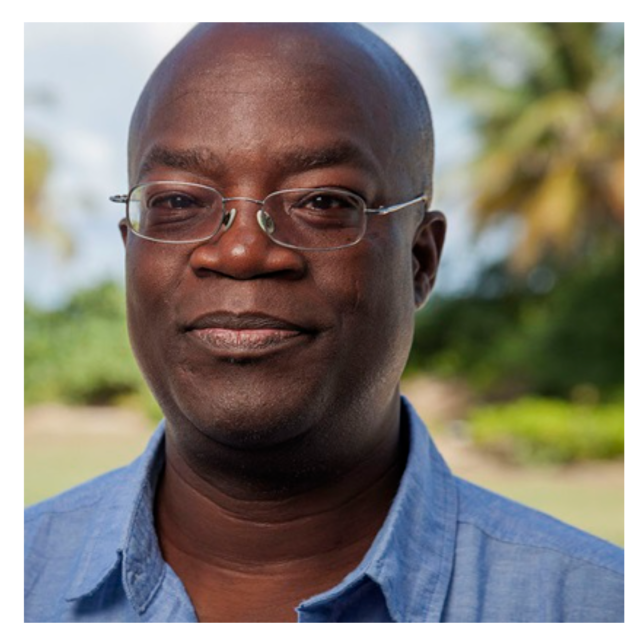POSTPONED: Land and Sea: Mathematics of the Climate Crisis-A Global Conversation
Speakers
Details
POSTPONED: Unfortunately this event has been postponed at short notice. It will no longer take place on March 18th, but will be rescheduled for later in the summer
About
Land and Sea: Mathematics of the Climate Crisis-A Global Conversation is the first in a series of twinned lectures organised by the Pacific Institute for Mathematical Sciences and the International Centre for Mathematical Sciences. The talks will take place in both Vancouver, BC, Canada (10:00 PST) and U.K. (17:00 GMT) online.
Abstracts
"How mathematicians can help to regenerating landscapes for a sustainable future" (Emily Shuckburgh, Cambridge Zero, University of Cambridge)
Many landscapes around the world are degraded, including through deforestation, intensive agriculture, urbanisation, pollution and climate change. This is having a devasting impact on biodiversity and in many instances is further exacerbating climate change. Moreover, healthy landscapes mean healthy people – we rely on the land for producing our food, our fresh water, and for our physical and mental wellbeing. We cannot keep plundering them, something has to change.
Understanding how we could manage the land differently to regenerate the natural processes that sustain us requires bringing together expertise from multiple domains across the sciences and social sciences to develop solutions that work for climate, nature, and importantly for the people who live and work in the landscapes. Importantly, it means taking a view of the landscape as a holistic system. As will be described in the talk, mathematicians can play a central role in supporting that analysis.
"Climate change, the ocean and Us" (Rashid Sumaila, University Killam Professor, Institute for the Oceans and Fisheries, University of British Columbia)
Our lives are intricately connected to the ocean as it provides us with invaluable resources. The ocean contributes significantly to our global food supply. Through international trade, it enables people all over the world to access the incredible nutritional benefits of seafood, including essential proteins and vital micronutrients. But climate change is posing as a big threat to the ocean and therefore to humans. Here, I will explore the effects of climate change on global fisheries using ecological-economic modeling approaches.
Schedule: All times Pacific
- 10:00 - 10:10 Welcome/ acknowledgments/ introduction
- 10:10 - 10:50 Emily Shuckburgh, Cambridge Zero, University of Cambridge
- 10:50 - 10:55 Break and introduction
- 10:55 - 11:35 Rashid Sumaila, Institute for Ocean & Fisheries, University of British Columbia
- 11:35 - 12:00 Q & A with discussion
Speaker biographies
Prof. Rashid Sumaila is a Professor and Canada Research Chair (Tier 1) in Interdisciplinary Ocean and Fisheries Economics at the Institute for the Oceans and Fisheries, and the School of Public Policy and Global Affairs, University of British Columbia. His research focuses on bioeconomics, marine ecosystem valuation and the analysis of global issues such as fisheries subsidies, marine protected areas, illegal fishing, climate change, marine plastic pollution, and oil spills. Sumaila has experience working in fisheries and natural resource projects in Norway, Canada and the North Atlantic region, Namibia and the Southern African region, Ghana and the West African region and Hong Kong and the South China Sea. Dr. Sumaila received his Ph.D. (Economics) from the University of Bergen and his B.Sc. (Quantity Surveying) from the Ahmadu Bello University. Sumaila is widely published and cited. He won the 2017 Volvo Environment Prize and was named a Fellow of the Royal Society of Canada in 2019.
Prof. Emily Shuckburgh OBE is a world-leading climate scientist and science communicator. She is also Professor of Environmental Data Science at the Department of Computer Science and Technology and leads the UKRI Centre for Doctoral Training on the Application of AI to the study of Environmental Risks (AI4ER). She is a Fellow of Darwin College, a Fellow of the Cambridge Institute for Sustainability Leadership, an Associate Fellow of the Centre for Science and Policy, a Fellow of the British Antarctic Survey and a Fellow of the Royal Meteorological Society.
Additional Information
PIMS and the International Centre for Mathematical Sciences (ICMS) have collaborated on organizing and running the online event. To see more about the event time in the UK and other details, visit the ICMS event page.

- Event Poster (301KB)

